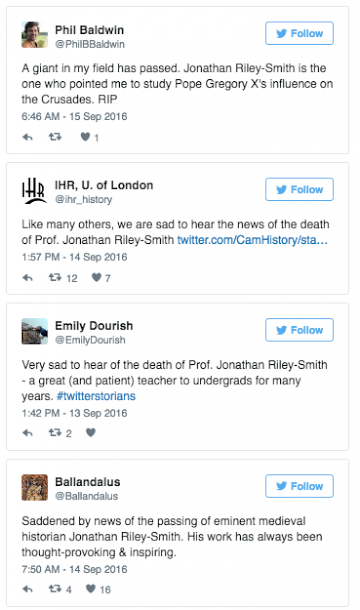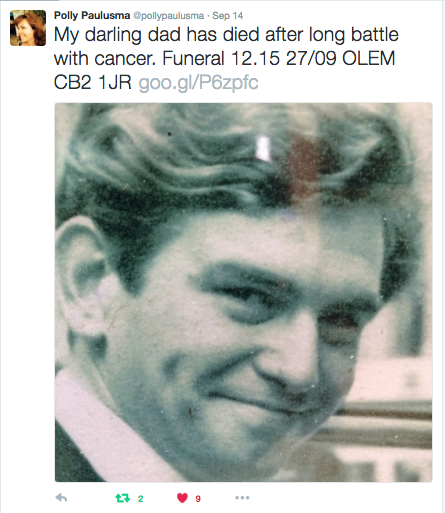Remembering Jonathan Riley-Smith
Last week news started to emerge on social media that one of the leading medieval historians of our time, Jonathan Riley-Smith had passed away. The University of Cambridge confirmed these reports, noting that he died on September 13th, at the age of 78.
Those of us who study the crusades will know how much of an influence Jonathan Riley-Smith has had on the field. He is the author of dozens of books and articles, and has changed many of the ways historians have viewed the Middle Ages. Here are just a few of the words said about him.
 On a personal level, I only had a few brief encounters with Professor Riley-Smith, who taught at the University of St Andrews, the University of London, and the University of Cambridge. He graciously allowed his article “The Venetian Crusade of 1122-1124” to be republished on De Re Miltiari. From what I have seen and read from his colleagues Jonathan was a pleasure to know and work with. David Perry reminisces that “he was also generous to younger scholars, praising their work, willing to stop in the middle of busy conferences to answer questions or listen. I had no higher praise than when, after a conference early in my career at Fordham, he came to tell me that my paper was good and should be published. It was.”
On a personal level, I only had a few brief encounters with Professor Riley-Smith, who taught at the University of St Andrews, the University of London, and the University of Cambridge. He graciously allowed his article “The Venetian Crusade of 1122-1124” to be republished on De Re Miltiari. From what I have seen and read from his colleagues Jonathan was a pleasure to know and work with. David Perry reminisces that “he was also generous to younger scholars, praising their work, willing to stop in the middle of busy conferences to answer questions or listen. I had no higher praise than when, after a conference early in my career at Fordham, he came to tell me that my paper was good and should be published. It was.”
The focus of Jonathan Riley-Smith’s work was about the First Crusade. He had been interested in the history of violence, and why people had gone to war. An article he penned last year for the Evening Standard reveals that his fascination in this was drawn in part on his personal experience of watching his father and grandfather take part in the World Wars. His research would take him to the events that were taking place at the end of the 11th century. In one of his books, he writes:
I had persuaded myself that the crusade was the pivot which the history of Christian war-theories turned. I became convinced that the ideas preached by Pope Urban II in 1095-96 were inchoate and that crusade theory would not have developed as it did were it not for the experiences on the march of the participants…I wanted to ask whether light could be thrown on the reasons why men and women had been prepared to engage in something so severe and unpleasant.
Jonathan Riley-Smith challenged the view that the men and women who took part in the First Crusade were motivated by the chance to become rich, or gain land in the Middle East. By researching charters and other evidence, he showed that those who went on crusade were making large financial sacrifices to do so, and did not expect to come home with new wealth. Instead, he found this group was drawn to this movement by deeply felt religious desires:
Although I am now certain that Pope Urban’s original message was more radical than I supposed, because I have become convinced that the most important element in it was the call to war as a penance.
Once his research was published, it drew praise from his fellow historians and quickly became must-reads for those who wanted to know about the crusades. Andrew Holt, for example, was one of the countless people who were profoundly influenced by his work:
Jonathan Riley-Smith was the most important crusade scholar of the last 40 years. His excellent works inspired me to study the crusades in graduate school. I recall it was his stunningly titled “Crusading as an Act of Love” that caught my attention as an undergraduate and from that point on I became fascinated with the varying debates among scholars over issues related to the crusading movement. I was hooked.
You can read more of Andrew Holt’s thoughts in Jonathan Riley-Smith on the Motivations of the First Crusaders
Since his groundbreaking research of the 1980s, Jonathan Riley-Smith has remained active as a researcher and writer. He has been willing to debate new ideas, and challenge existing beliefs. Helen Nicholson sums up his academic career with these words: “He transformed the study of the crusades and made it a vibrant research area.”
He has also been very concerned with the influence the crusades have had on more modern times, and worried that misperceptions of this event have corroded relations between the Western and Islamic worlds. For example, in his 2008 book The Crusades, Christianity, and Islam, Riley-Smith noted:
I have traveled from the eleventh century to the twenty-first, concentrating on the periods 1095 to 1300 and 1800 to 2007. We are today subjected to religio-political hostility, erupting in acts of extreme violence, and a war of words in the course of which the Crusades feature prominently. We cannot hope to understand the circumstances in which we find ourselves unless we are prepared to face up to fact that modern Western public opinion, Arab Nationalism, and Pan-Islamism all share perceptions of crusading that have more to do with nineteenth-century European imperialism than with actuality.
He also issued words of warning to us, that we should not look at the crusades as such as a distant and remote event, and that our capacity for violence has not diminished in the succeeding centuries:
Before we become too certain of our rectitude and complacent about how far our society has advanced, we should remember that secular ideological violence - “ethical” in the sense that it is employed on behalf of a religious or cultural or even pseudoscientific ideal that is considered by its adherents to be of universal importance - has manifested itself recently in wars waged in the names of imperialism, nationalism, Marxism, fascism, anticolonialism, humanitarianism, and even liberal democracy.
Please also read his article Rethinking the Crusades and watch this video of him talking about the field.
Most importantly, Jonathan Riley-Smith was a husband to Louise Riley-Smith, and together they raised three children.

